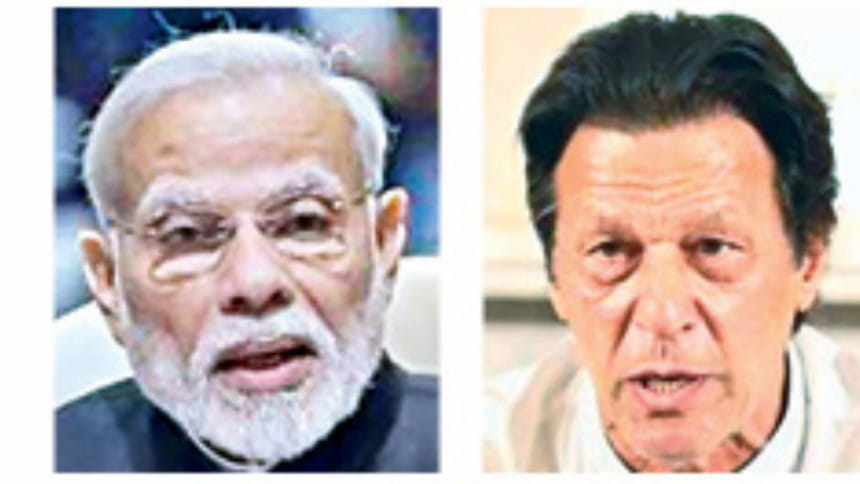Kashmir Issue at UN: Modi silent, Imran fumes

Indian Prime Minister Narendra Modi, at UN, yesterday urged the world to unite against terrorism but avoided mentioning the Kashmir issue, while his Pakistani counterpart accused India of planning bloodbath there.
Addressing the UN General Assembly, Modi said terrorism is one of the biggest challenges before humanity.
“We believe that terrorism is not a challenge for any one country but for all countries and for humanity. For the sake of humanity, the world has to unite against terror,” Modi said.
“We belong to a country that has given the world Buddh (Buddha’s message of peace), not ‘Yuddh’ (war). When we raise our voice against terror, it is with seriousness and anger,” said Modi, who took the podium before Pakistan Prime minister Imran Khan.
Without naming Pakistan, Modi said there needed to be more anger globally about what terrorism was doing to humanity.
A divided world, the Indian PM said, was in nobody’s interest. “Neither do we have an option to restrict ourselves to our borders. Multilateralism is the essence, we need give a new direction,” he said.
In his 20-minute speech, he also spoke about India’s fight against global warming and its development initiatives.
“Per capita wise India’s contribution to global warming is very low, but we are a leading nation in mitigation plans,” Modi said in his address to world leaders at the UNGA in New York.
He announced his commitment to make the country single-use plastic free.
While Modi avoided mentioning Kashmir, Pakistan’s Prime Minister Imran Khan took the world stage to highlight the issue.
He warned there would be a bloodbath when India lifts its curfew in disputed Kashmir and that any all-out conflict between the two nuclear-armed nations would reverberate far beyond their borders.
“There are 900,000 troops there, they haven’t come to, as Narendra Modi says -- for the prosperity of Kashmir... These 900,000 troops, what are they going to do? When they come out? There will be a bloodbath,” he said.
“If this goes wrong, you hope for the best but be prepared for the worst,” Khan said.
“If a conventional war starts between the two countries ... anything could happen. But supposing a country seven times smaller than its neighbor is faced with the choice – either you surrender or you fight for your freedom till death?
“What will we do? I ask myself this question ... and we will fight. ... and when a nuclear-armed country fights to the end, it will have consequences far beyond the borders.”
Ahead of the speeches of the India and Pakistan leaders, security forces in Indian administered Kashmir imposed tough new restrictions, fearing protests.
Concrete and razor wire barricades went up across Srinagar and other towns in the disputed Muslim-majority territory, which has been under lockdown since New Delhi scrapped Kashmir’s semi-autonomous status in early August.
“There were worries about big protests after Friday prayers. Similar restrictions are in place in other towns and areas,” a police officer told AFP on condition of anonymity, as he was not authorised to speak to media.
Schools and colleges have also remained shut, along with stores and many businesses. The main business district was largely deserted with soldiers barring entry to the area.
US PRESSES INDIA ON KASHMIR RIGHTS
On Thursday, US pressed on New Delhi to quickly ease restrictions imposed in Kashmir.
Alice Wells, the top State Department official for South Asia, also reiterated President Donald Trump’s willingness to mediate to ease tensions between India and Pakistan over the territory.
Trump met separately this week with both Modi and Khan.
While Trump has forged a close bond with Modi, joining the Hindu nationalist at a massive rally on Sunday in Houston where the Indian leader boasted of his actions in Kashmir, a senior official said that the United States had concerns over the clampdown in the region.
“We hope to see rapid action -- the lifting of the restrictions and the release of those who have been detained,” Alice Wells told reporters.
While some measures have been eased, internet and cellular service has remained off in Kashmir for well over a month.
Hundreds of Kashmiris are being held in detention without any charge announced, including both pro-Indian and pro-separatist political leaders. Nearly 200 people have been sent to Indian jails outside the restive Himalayan region, according to official records seen by AFP.
Kashmir is divided between India and Pakistan and served as the trigger for two of their full-fledged wars.
India, however, has long rejected any outside role on Kashmir and quickly shot down the idea after Trump mentioned mediation in a July meeting with Khan.
The Modi government says that its actions will spur economic development in Kashmir and defends the restrictions as temporary means to ensure calm and prevent Pakistan from meddling.
Kashmir inflames passions across South Asia, with right-wing Hindu activists long seeking to rescind its special status within India -- and Pakistani politicians saber-rattling over the Himalayan territory for decades.
Khan has used his New York trip to make fiery denunciations of Modi, even likening his ideology to Nazi Germany.
Wells characterised Khan’s comments as unhelpful, saying: “A lowering of rhetoric would be welcome, especially between two nuclear powers.”
She also questioned why Khan was not also speaking out about China, which has detained an estimated one million Uighurs and other Turkic-speaking Muslims.
“I would like to see the same level of concern expressed also about Muslims who have been detained in western China, literally in concentration-like conditions,” she said.
China is a major diplomatic and economic partner of Pakistan. Khan, asked about the Uighurs at a think tank on Monday, declined comment, saying that Pakistan had a “special relationship” with China and would only raise issues in private.

 For all latest news, follow The Daily Star's Google News channel.
For all latest news, follow The Daily Star's Google News channel. 



Comments